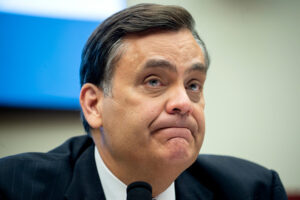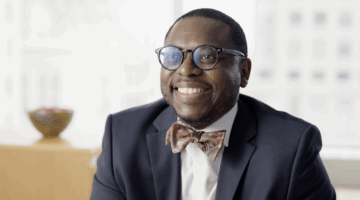
(Photo by Bonnie Cash-Pool/Getty Images)
The latest indictment of Donald Trump and his cronies alleges a widespread criminal enterprise to overturn the legitimate results of the Georgia election. And whenever Trump finds himself on the wrong end of the law — an increasingly common event — Fox News is there to soothe any cognitive dissonance its Law & Order audience might feel about Glorious Leader.
This morning, they brought on MAGA pullstring toy Jonathan Turley to explain why the whole prosecution is fake news. The indictment is “troubling” to Turley on a lot of levels but mostly because it criminalizes speech.

How Legisway Helps In-House Teams Manage All Legal Matters In One Trusted Place
Operate with AI driven insights, legal intake, unified content and modular scalability to transform efficiency and clarity.
Sort of.
Not really.
Fox's Jonathan Turley decries Trump’s new conspiracy indictment: “Every tweet, every speech seems to be a separate criminal act” pic.twitter.com/edi8YCjIj3
— Media Matters (@mmfa) August 15, 2023

How The Law Office Of Stephen L. Thomas Jr. Reclaimed Valuable Hours And Strengthened Client Care With 8am
Founded in 2017, the Baltimore-based Law Office of Stephen L. Thomas Jr. unified case management, communication, and payments with 8am—saving 10–20 hours a week for clients, trials, and growth.
This is not true.
But it is a talking point parroted by lot of conservative social media and that’s as good as any Criminal Law hornbook for Turley to grant his stamp of “legal expert” approval. This is what commencement speakers mean when they say Turley uses his legal credentials for “wrongful ends.”
Indicative of how far down the right-wing talking point rabbit hole he’s gone, he also repeats the claim that Fulton County accidentally and preemptively published the indictment. Earlier on Monday, conservative X was all atwitter that the fix was in and the indictment was already prepared before the grand jury ever met, citing a document found by a Reuters reporter that was allegedly published and then quickly taken off the court website. The clerk’s office has since issued a statement declaring the whole document “fictitious.” In fact, the case number on the alleged preemptive indictment corresponds to a sex offender’s criminal case. Say what you will about Trump in light of the E. Jean Carroll case, the Georgia case is not about him being a sex offender.
This does not present even a speedbump to Turley’s analysis. [UPDATE: Ultimately, a clerk copped to publishing a dummy document to test the system. Hence the document having an arbitrary case number and all.]
In any event, the “this makes everything a crime” talking point going around combs the indictment for paragraphs like this one:
On or about the 7th day 0f December 2020, DONALD JOHN TRUMP requested that Bill White, an individual associated with the Trump Campaign then residing in Fulton County, Georgia, provide him with certain information, including contact information for Majority Leader of the Georgia Senate Mike Dugan and President Pro Tempore of the Georgia Senate Butch Miller. The following day, White sent an email containing the requested information to RUDOLPH WILLIAM LOUIS GIULIANI, unindicted co-conspirator Individual 5, whose identity is known to the Grand Jury, and others. This request was an overt act in furtherance of the conspiracy.
… and then claim that the indictment makes it illegal to send emails. This analysis preys on the public’s lack of legal knowledge — the phenomenon that a competent legal analyst attempts to overcome rather than flog — to gin up the false impression that prosecutors are trying to make something as mundane and innocent as an email into a crime.
But that’s not what’s happening here. In fact, it’s the exact opposite.
The whole reason criminal conspiracies require an “overt act” is to prevent criminalizing speech. You’re free to drunkenly rant about robbing a bank all you want. Once you buy a ski mask and call your Tommy from your old crew out of retirement with promises of one last big score as he looks longingly at his promising young daughter, who he pledged on his father’s deathbed he’d give up this life for, but the tuition bills for the private art school she’s attending are becoming too much though she’s a prodigy and he can’t in good conscious deny her dream so he finally begrudgingly agrees “you son of a bitch, I’m in,” that turns the conspiracy from idle speech to a crime that can be prosecuted.
An “overt act” is not necessarily a “criminal act.” But a jury must find that a defendant took an “overt act” as part of bringing a conspiracy to fruition before it’s a crime. For example, it’s not illegal to buy Drano. Nor is it illegal to say one wants to poison someone if they never do anything about it. But it is illegal if one says they plan to poison someone… and then buys Drano. At that point, a jury can decide that this wasn’t idle talk, but a real criminal plan that the defendant intended to pull off. To put Turley’s reckless commentary in perspective, he’s telling the audience that in that example: it’s troubling that prosecutors are treating every time you buy cleaning supplies at Wal-Mart as a crime.
Returning to the indictment, it’s not illegal for Trump to email someone for contact information. But if Trump sought that contact information because he thought those people could help his plan with Giuliani (and others) to illegally subvert the election results, then that email can be an overt act that took the election interference plot from idle talk to a nascent criminal act.
This is also, for what it’s worth, the problem with Turley analogizing the allegations in the indictment to Marc Elias asserting election challenges. Marc Elias publicly claimed flaws with NY voting machines impacted an election. Which is true! The difference is that Elias said that and filed a lawsuit, while Trump said that — according to the indictment — as part of a bid to convince state legislators to certify alternate Electors in contravention of state law. Neither statement is illegal. Both could be an overt act in furtherance of a conspiracy if one existed.
Marc Elias was decidedly not engaged in a criminal conspiracy. Donald Trump, on the other hand….
But Jonathan Turley isn’t going to be invited back on Fox with that commentary, so why not just spout a bunch of utter nonsense that the audience wants to hear instead?
 Joe Patrice is a senior editor at Above the Law and co-host of Thinking Like A Lawyer. Feel free to email any tips, questions, or comments. Follow him on Twitter if you’re interested in law, politics, and a healthy dose of college sports news. Joe also serves as a Managing Director at RPN Executive Search.
Joe Patrice is a senior editor at Above the Law and co-host of Thinking Like A Lawyer. Feel free to email any tips, questions, or comments. Follow him on Twitter if you’re interested in law, politics, and a healthy dose of college sports news. Joe also serves as a Managing Director at RPN Executive Search.